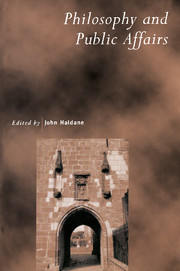Book contents
- Frontmatter
- Contents
- Notes on Contributors
- Introduction
- In Defence of Individualism
- Market Boundaries and Human Goods
- A Tale of Three Karls: Marx, Popper, Polanyi and Post-Socialist Europe
- Liberty's Hollow Triumph
- Politics, Religion, and National Identity
- Contemporary Art, Democracy, and the State
- Popular Culture and Public Affairs
- Welfare and the State
- Questions of Begging
- Philosophy and Educational Policy
- What did John Dewey Want?
- Educating for Citizenship
- Being Human: Science, Knowledge and Virtue
- Index
Questions of Begging
Published online by Cambridge University Press: 20 May 2010
- Frontmatter
- Contents
- Notes on Contributors
- Introduction
- In Defence of Individualism
- Market Boundaries and Human Goods
- A Tale of Three Karls: Marx, Popper, Polanyi and Post-Socialist Europe
- Liberty's Hollow Triumph
- Politics, Religion, and National Identity
- Contemporary Art, Democracy, and the State
- Popular Culture and Public Affairs
- Welfare and the State
- Questions of Begging
- Philosophy and Educational Policy
- What did John Dewey Want?
- Educating for Citizenship
- Being Human: Science, Knowledge and Virtue
- Index
Summary
It has always seemed to me that one of my father's great contributions to monarchical practice was the manner in which, without apparent design, he managed to resolve the internal contradictions of monarchy in the twentieth century that requires it to be remote from, yet at the same time to personify the aspirations of the people. It must appear aloof and distant in order to sustain the illusion of a Monarch who, shunning faction, stands above politics and the more mundane allegiances. At the same time it must appear to share intimately the ideals of the multitude, whose affection and loyalty provide the broad base of constitutional Monarchy. My father, with the instinctive genius of the simple man, found the means of squaring the apparent circle within the resources of his own character. By the force of his own authentic example – the king himself in the role of the bearded paterfamilias … he transformed the Crown as personified by the Royal Family into a model of the traditional family virtues, a model that was all the more genuine for its suspected but inconspicuous flaws. The King, as the dutiful father, became the living symbol not only of the nation, but also of the Empire, the last link holding these diversified and scattered communities.
Thus did the Duke of Windsor describe his late father, King George V. The account and the sense of political values that inform it sit uneasily with the aspiration to rationality and interest-security that seems inherent in professional political philosophy.
- Type
- Chapter
- Information
- Philosophy and Public Affairs , pp. 121 - 134Publisher: Cambridge University PressPrint publication year: 2000

